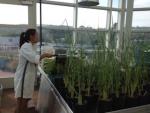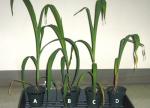Rupali Datta's Profile

- Member for:
11 years 2 months - Institution:
Michigan Technological University
Biography
Dr. Datta’s primary research interest lies in the application of plant biochemistry, genetics, molecular biology and microbiology in solving environmental problems,using phytoremediation, plant-microbe interactions and bioremediation. Dr. Datta’s research involves the study of interactions between plant, soil, microbial and water systems to understand the mechanisms of uptake and detoxification of specific environmental contaminants in biota from two broad angles – biochemistry and genetics.Specifically, Dr. Datta’s current research focus is on the study of bioavailability of metal and organic contaminants in aquatic media and the potential of using plants to remediate contaminated sites, mediated by microbes. Dr. Datta actively collaborates with environmental geochemists, soil scientists, microbiologists and analytical chemists. Dr. Datta also works on the bioavailability of contaminants using in-vitro and in-vivo models. She has also been working on the remediation of antibiotics, TNT, RDX, petroleum hydrocarbons, perchlorate and chromate in soil and water and in developing “green technology” as part of an environmental R&D, SIROM Scientific Solutions, LLC based in Montclair, New Jersey. Combining field, greenhouse, and laboratory data, she investigates the mechanisms of contaminant bioavailability, availability to plants, the kinetics of contaminant uptake in plants under various conditions and studies the molecular mechanisms of contaminant uptake and detoxification by accumulator and other high biomass plants, including crop plants. She also works on health effects of metals (arsenic and lead) in human cell culture and animal systems in collaboration with biomedical faculty.
Rupali's research projects
Soils in the region are heavily contaminated with heavy metals due to history of mineral mining. This is a problem because it can pose health and environmental risks.Our solution is to make a value added product, ethanol, from the grasses after they have been used to clean up the soil contaminants.
Stamp sand in Upper Peninsula, Michigan is the result of copper mining activity leading to soil with high levels of copper and low levels of nutrients.
A multitude of anticancer treatments exist, but most of these options kill both a patient’s healthy cells and their cancerous ones. A surprising alternative may have been discovered, in rice callus. Test results have shown 80 to 95 percent of cancerous cells die when treated with rice callus, with almost no effect on normal cells—a very promising discovery.



 Gifts to projects listed on SUPERIORIDEAS.ORG are received and processed by Michigan Tech Fund. Michigan Tech Fund is a tax-exempt organization under Section 501(c)(3) of the Internal Revenue Code acting on behalf of Michigan Technological University. It is the policy of Michigan Tech Fund that a portion of the gifts and/or income therefrom may be used to defray the costs of raising and administering the funds.
Gifts to projects listed on SUPERIORIDEAS.ORG are received and processed by Michigan Tech Fund. Michigan Tech Fund is a tax-exempt organization under Section 501(c)(3) of the Internal Revenue Code acting on behalf of Michigan Technological University. It is the policy of Michigan Tech Fund that a portion of the gifts and/or income therefrom may be used to defray the costs of raising and administering the funds.